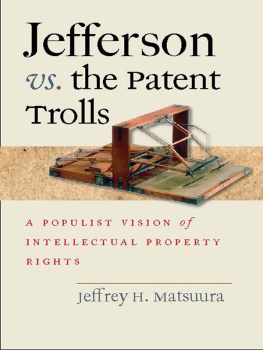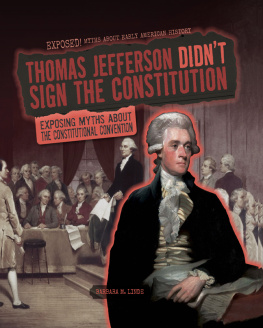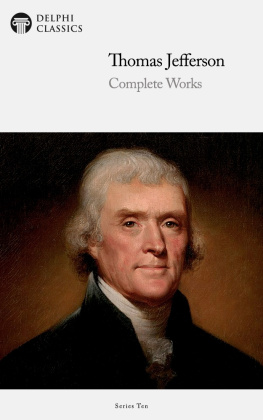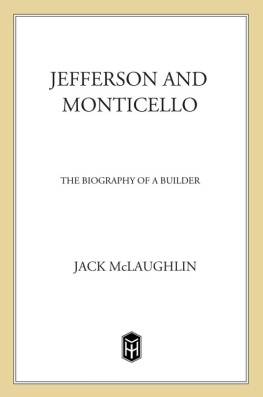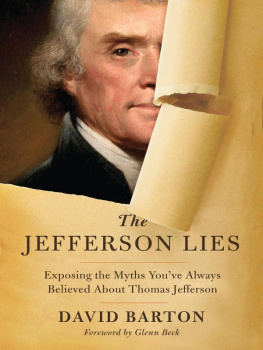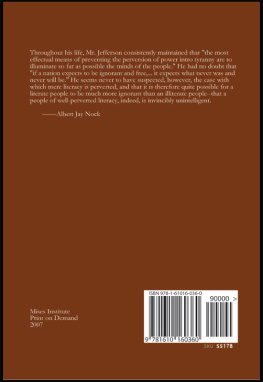To Harry and Tomeko Matsuura for their unwavering support, to Janice and Anne for their insights and good humor, and to my old friends Fuzz, Beau, and Zum
INTRODUCTION
In today's world we place great emphasis on inventions and other creative works. Intellectual property law rightspatents, copyrights, trademarks, and trade secretsreceive substantial attention. Individuals and nations alike recognize the significant potential economic value of intellectual property rights, having seen over time numerous examples of how inventions and other original works can transform into large profitable businesses and lifestyle-changing products. Intellectual property is widely seen to be a source of economic potential. It is treated as an important asset. There is tension regarding rights of ownership of, access to, and use of intellectual property.
The concept of intellectual property is subject to many different definitions. Viewed from one perspective, intellectual property consists of those forms of tangible and intangible property for which the law grants enforceable proprietary rights. In practice, however, the concept of intellectual property extends beyond the limits of intellectual property law. For example, information and knowledge, although they may sometimes be subject to the formal provisions of intellectual property law, are often places where intellectual property extends beyond the scope of the traditional categories of patents, copyrights, trademarks, and trade secrets.
Our discussion in this book applies this broader notion of intellectual property. It examines Thomas Jefferson's perspective on traditional forms of intellectual property. Yet the book also addresses Jefferson's approach to some of the more expansive and less formal versions of intellectual property, including information and knowledge. We will examine Jefferson's philosophy regarding the significance of the full range of intellectual property forms, including both the property that falls within the scope of traditional intellectual property law and the material that represents the fruit of human creative effort but is not included within the scope of traditional intellectual property law.
It is important to note that Jefferson did not create or express a single comprehensive vision of intellectual property rights. He did not approach intellectual property rights from the perspective of a scholar. Instead, he approached those rights from the perspective of a practitioner. Jefferson was a creator and user of intellectual property. He was also a public servant tasked with granting and overseeing intellectual property rights. As a practitioner, he was interested in fostering both the widespread creation and the use of intellectual property. He faced a wide range of intellectual property rights issues and challenges from a variety of perspectives. His writings and actions in response to those issues and challenges provide helpful insights for practitioners today who also face important intellectual property management questions.
Ours is not the first generation to appreciate the importance of intellectual property. The world of the eighteenth and nineteenth centuries was also transformed by the social, political, and economic impact of inventions and other creative works. That period was also a time, like the present, when perceptions of intellectual property and how it should be managed were evolving. The rise in significance of intellectual property began during that era. It was the first time when attention was paid to the sometimes competing interests of the developers of new works and the users of those works. Thomas Jefferson was an active participant in the efforts to balance incentives for creators of innovative works with broad, rapid public access to those innovative works.
Jefferson's perspective on the significance of intellectual property was far more complete than that of virtually any other major American figure. As a scientist, he understood and respected the critical value of access to information and shared knowledge. As an inventor, he recognized the importance of refinements and enhancements to products and processes. A pioneer patent officer for the United States, Jefferson effectively created the patent review process, at least from an operational perspective. Yet he was also an active consumer of intellectual property developed and controlled by others. In that role, he learned firsthand the frustration encountered by those who depend on the creations of others. If anyone possessed a full understanding of intellectual property rights and their connection with invention and creativity, it was Jefferson.
Jefferson's varied experience with intellectual property is important, not because it illustrates a unified vision of intellectual property rights, but because it provides helpful guidance for practitioners today who struggle with many of the same technology and intellectual property management issues that Jefferson and his colleagues faced. Jefferson expressed his vision of the goals of intellectual property rights, not through a single scholarly thesis, but through an array of actions and various brief written references.
At its core, this book illustrates how the broad perspective Thomas Jefferson developed with regard to intellectual property enabled him to place knowledge, works of invention, and other creative works in their proper place. He recognized that they were essential for the economic prosperity and vitality of this and all other nations. Yet Jefferson also recognized that their impact on American society, and other societies, extended beyond their economic value. He observed that those works were also critical to the political health of the nation. For Jefferson, a healthy democracy required an informed and inquisitive populace. Thus information and works of innovation were a necessary component of healthy political life.
Jefferson recognized another key aspect of invention and creation. He saw them as prerequisites for an equitable social order, and he acknowledged them as the mechanism through which mankind continued its progress toward perfection. A believer in the perfectibility of man, Jefferson viewed the acquisition of knowledge and the application of knowledge to creative, innovative purposes as the engine that drove man's march toward perfection. Intellectual property was more than a collection of assets. It provided the fuel that enabled mankind to drive toward a more just society.
He also saw knowledge and information as critical keys to improving the human condition. The acquisition of knowledge enabled man to come to terms with the forces of nature, harnessing them for the public good. Moreover, information and knowledge were great equalizers, permitting individuals of limited economic means and low social status to take greater control over their lives and to exert influence on the overall form of society. Knowledge empowered the individual and improved the quality of life in the society.

